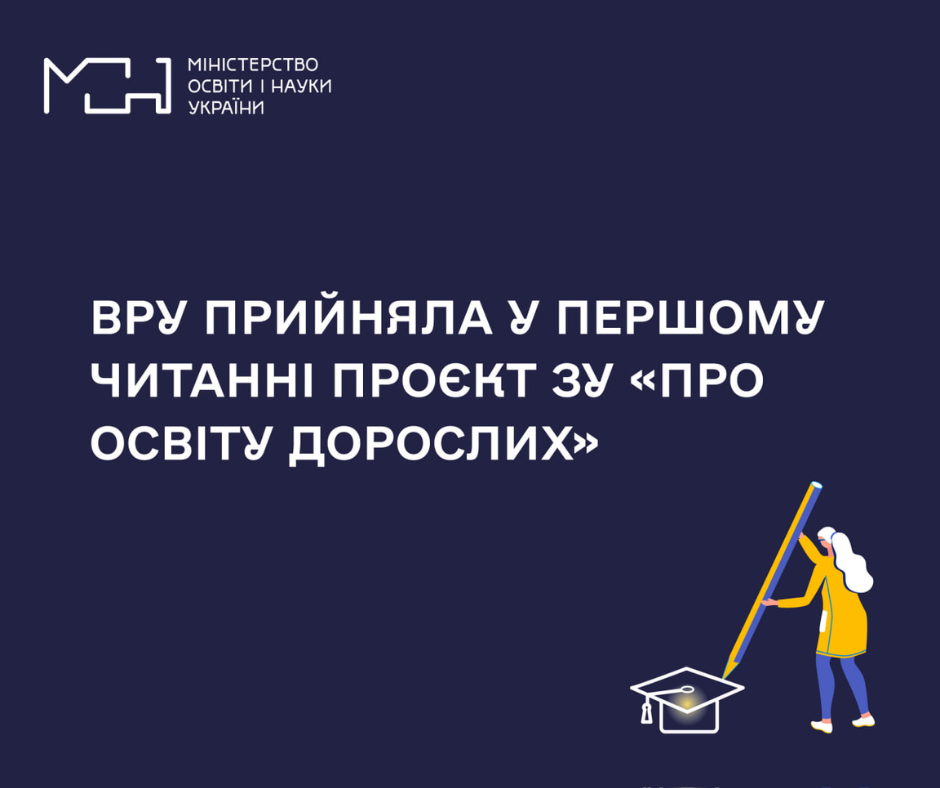This draft law is extremely relevant and expected in society:
- firstly, it regulates and systematizes relations in the system of adult education, ensures the development of this component of education in the medium-term perspective;
- secondly, the draft law is European integration, it was developed to fulfil task 1431 of the Action Plan for the Implementation of the Association Agreement between Ukraine, on the one hand, and the European Union, the European Atomic Energy Community and their member states, on the other hand, approved by a Cabinet resolution of Ministers of Ukraine dated October 25, 2017 No. 1106.
In general, the draft law takes into account the experience and main recommendations of the European Union on the development of lifelong education and adult education, as well as domestic developments on this issue.
The draft law proposes a new ideology of adult education, which involves the re-industrialization of this system.
In particular, new purposes, architecture and forms have been determined, and a new thesaurus has been formed:
- the components of the adult education system, which determine the main directions of activity in this area, are clearly defined and fixed at the legislative level;
- the draft law lays down the creation of opportunities for the personal and professional development of a person, his/her social activity, which ensures the satisfaction of various social and economic needs at the level of the community, region, and state;
- mechanisms aimed at forming a network of service providers in the field of adult education, diversification of forms of activity, wide involvement of civil society, competition of educational programs, quality of educational services, recognition of learning results obtained, in particular, through non-formal education, are established.
In addition to the above, the norms of the draft law establish a joint distribution of duties, powers and responsibilities between the state, employers and citizens:
- leadership in the formation of policy in the field of adult education and active participation in this process by local authorities and the public are secured by the state;
- responsibility for their implementation is distributed among the state (which promotes, creates conditions, provides support), local authorities (which create conditions and ensure implementation), employers (who ensure the professional development of their employees) and citizens who are aware of the need for continuous training, as a result of which a social “fashion” for lifelong learning is being formed;
- it is the distribution of powers and responsibilities that makes it possible to ensure the specific needs of regions and communities regarding adult education, diversify financial resources, and make the adult education system more efficient.
These and other norms of the draft law:
- establish adult education as a separate component of education that has social value;
- lay the institutional foundations of cooperation among the state, local self-government bodies and providers of adult education, as well as provide for elements of self-regulation in this field of education;
- provide state support for adults to obtain formal education again through the introduction of preferential lending;
- determine the types of service providers in the field of adult education and their features, powers of management bodies, quality assurance system and economic relations in the field of adult education;
- lay the legislative basis for the functioning of adult education centres, primarily as communal centres of educational activity among the adult population, which corresponds to the policy of decentralization, in particular the expansion of the powers of local authorities, the formation and implementation of regional education policy in accordance with the needs of communities.
Earlier, access to grant programs in the field of digital transformation of a wide variety of industries was opened, the selection of pilot universities for the assessment of corruption risks and the development of anti-corruption programs is underway, a grant competition for projects in the field of “green” energy has started, recruitment for internships at Polish universities as part of the Ivan Vyhovsky Award is underway, the recruitment of participants for the “Debate+” course has been announced, and the enrolment of participants for the second Creatify Academy of Influencers is underway.
Media Center of
National University “Yuri Kondratyuk Poltava Polytechnic”



